
"I cannot undertake to lay my finger on that article of the Constitution which granted a right to Congress of expending, on objects of benevolence, the money of their constituents." - James Madison, the father of our Constitution
Wednesday, October 6, 2010
Tuesday, October 5, 2010
Stealing the American Dream
Originally found at Getliberty.org and reproduced here because eminent domain abuses run rampant.
By Rebekah Rast

The Singh/Kaur family came to America from India in hopes of a better life and increased opportunity.
The family settled in New York and has since run two gas stations in the West Harlem neighborhood of Manhattanville. For 25 years the family worked around the clock to maintain its stations and even installed a car wash on one of them.
The business is all the family has.
“This is their official business,” says David L. Smith, attorney for the Singh/Kaur family. “It’s what they do, it’s what they own — this is their livelihood.”
If you go to the family’s gas station now, you will notice that the car wash is no longer working. Why? The Singh/Kaur family can’t take out a loan to have it fixed.
It’s not because they have bad credit or wouldn’t be able to pay the loan off, it’s because they are being threatened with eminent domain. No bank will finance property that might be taken away.
In the same neighborhood, Nick Sprayregen owns his storage facility, Tuck-It-Away Associates, LP. He houses items for about 2,000 local families and small businesses within his four-building operation.
Sprayregen’s business has taken a hit. Possibly due to the economy, but mostly because of the same threat of eminent domain that is trying to take the land of the Singh/Kaur family.
Neither property owner is giving up their land without a fight.
The entity attempting to seize the land from these property owners is Columbia University, a private school. The university wants to build a new 17-acre campus in the neighborhood of Manhattanville.
Current New York law considers property in “blight” conditions, a condition of disrepair, to be able to be seized by eminent domain procedures. With a loose definition of what “blight” conditions look like, many corporations and cities have seized on opportunities to takeover properties they justify as “blighted.”
Columbia University partnered with Empire State Development Corporation (ESDC), a quasi-government authority, to take over the land.
As previously reported by Americans for Limited Government (ALG), Manhattanville business owners’ attorney Smith and former New York Civil Liberties Union Executive Director Norman Siegel were able to prove that Columbia and ESDC conspired together to produce the conditions of “blight” that would then allow the ESDC to seize the property wanted by the university. They also found that many of the “blighted” buildings were already owned by Columbia and it was the university’s responsibility to clean them up. Because the university was not keeping the buildings and spaces up to code, many of the businesses in the area were forced to move out. Constant threats of eminent domain also caused them to leave.
In December 2009, a state appellate court struck down the ESDC’s actions as illegal. The case was then heard by the Court of Appeals on June 1st, 2010.
The decision from the Court of Appeals, as reported by The New York Times, overturned the appellate court’s ruling that barred the state from using its power of eminent domain to take private property.
A disappointing loss for the Singh/Kaur family and for Sprayregen.
“It is ethically reprehensible that a private entity should partner with a government agency to take private land,” Sprayregen says.
The Singh/Kaur family’s attorney went onto say that this battle of Columbia trying to take their private property has been going on for eight years. “Over eight years of pushing and Columbia has only made one financial offer to the family for the land. It was very low and completely inadequate.”
The only option left for the property owners is the United States Supreme Court. Papers have already been filed. Now they must wait with their fingers crossed in hopes that the Supreme Court will hear the case.
Smith believes they have a chance.
About five years ago the Supreme Court made a questionable ruling in another eminent domain case, Kelo vs. City of New London. Susette Kelo was a property owner in New London, Connecticut, when pharmaceutical company Pfizer decided it wanted a new corporate facility in her neighborhood. The Supreme Court ruled in favor of the pharmaceutical giant and an entire neighborhood was stripped down for its new facility, shops, restaurants and hotels.
The rest of the story is even more devastating. Four years after the Supreme Court ruling, Pfizer moved out. Land that once provided families with a home was now empty and barren.
The case received national attention and since then, many states have reformed their eminent domain laws to protect the rights of property owners.
New York has not.
The eminent domain laws in some states are skewed such that if you have more money, more power, friends in the right places and partner with the right agencies, then whatever land you want can be yours.
Eminent domain was never supposed to look like that.
The laws established by America’s Founding Fathers were a way for the country to grow and prosper for the benefit of all mankind. Eminent domain was primarily in place to be used for roads and other public services.
Part of what makes America great is that its citizens have the right to own their own property. It gives them a place of their own, makes them feel established and gives them a sense of pride.
It is the American Dream, after all.
“No matter how big a business, private entity, corporation or even the government, the rights of a property owner should stand even bigger and stronger,” says Bill Wilson, president of ALG. “Their voice should be heard the loudest and their property valued the highest.”
The Supreme Court has another chance to right a past wrong in the case of eminent domain.
“This would be the perfect case for the Supreme Court to do some tweaking,” Smith says, in regards to the outrage over the Kelo case ruling. “We are keeping our fingers and toes crossed.”